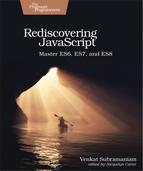Safer Code with let and const
var does not have block scope and, in the past, that led developers to use a JavaScript design pattern known as Immediately Invoked Function Expression (IIFE) or the Self-Executing Anonymous Function. This pattern was also used to hide variables and functions from outside visibility. In this pattern, lines of code are wrapped inside an anonymous function that is immediately executed.
For example, in the following code, the variable sqrt defined within the block is hoisted to the top of the file and becomes unintentionally available outside of the intended scope.
| | //BROKEN CODE |
| | 'use strict'; |
| | |
| | var result = 0; |
| | for(var i = 0; i < 5; i++) { |
| | var sqrt = Math.sqrt(i); |
| | result += sqrt; |
| | } |
| | |
| | console.log(result); |
| | |
| | console.log(sqrt); //sqrt is visible here, though not intended |
To avoid issues like this, the IIFE design pattern was often used. For example, let’s use the pattern to implement the previous code:
| | //BROKEN CODE |
| | 'use strict'; |
| | |
| | var result = (function() { |
| | var result = 0; |
| | |
| | for(var i = 0; i < 5; i++) { |
| | var sqrt = Math.sqrt(i); |
| | result += sqrt; |
| | } |
| | |
| | return result; |
| | })(); |
| | |
| | console.log(result); |
| | |
| | console.log(sqrt); //ERROR because sqrt is not visible here, |
| | //that's the desired behavior |
There’s a reduced need for this pattern in ES6 and beyond. That’s because let and const have block scope. Furthermore, as we discuss in Chapter 9, Using Modules, modules have restricted visibility. Where you may have used the IIFE design pattern in the past to limit variables from being hoisted, you can rely instead on the language features to limit the scope. This greatly reduces the need to wrap lines of code in anonymous functions that are immediately executed. We can instead enjoy less ceremony, and write fewer lines of code—code that is more intuitive and less error prone.
